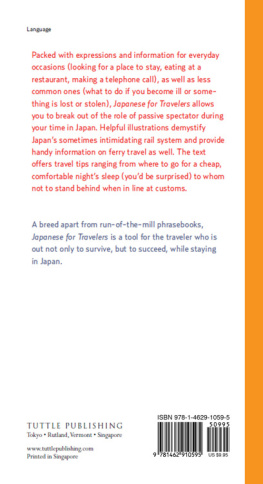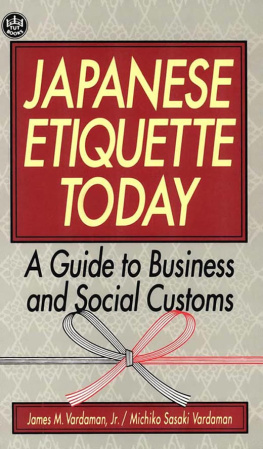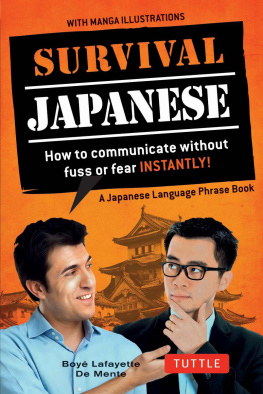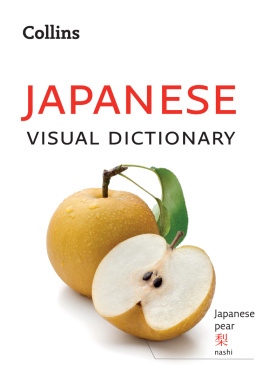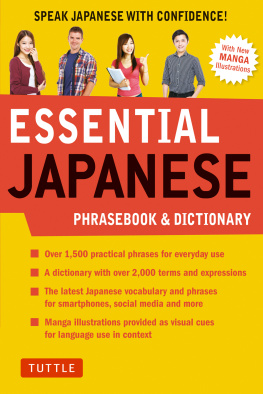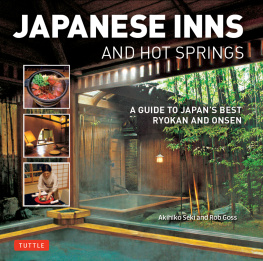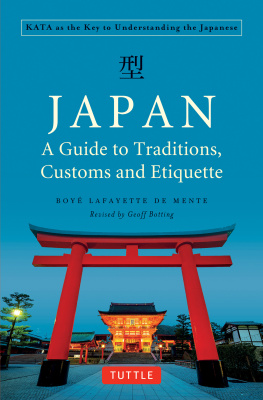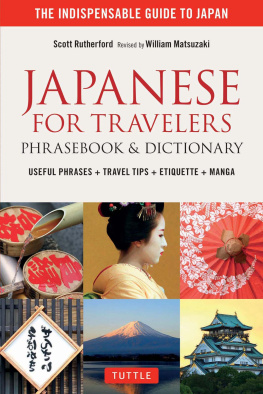bunp
grammar
Basics
GRAMMAR
Theres no way to become fluent in Japanese in a week, three weeks, or three months. Probably not in a year, or even three. Certainly not by using this book, for its not intended to be a language course.
Spoken Japanese is not especially difficult: neither grammar nor syntax is particularly complex. In fact, Japanese is probably easier to learn than English. (The Japanese, however, prefer perpetuating the myth that Japanese is the worlds most difficult language.)
Written Japanese, on the other hand, is a challenge. It uses katakana and hiragana two phonetic alphabetsand around 2,000 Chinese characters, or kanji . Roman letters also often appear, especially in advertising.
Most difficult, however, are the embedded cultural and social codes of the Japanese language. To fully grasp the more veiled of these practically requires being born Japanese.
Within a group, the ideal form of communication is that which is sparse and ambiguous. Messages are conveyed through verbal fuzziness, contextual clarity, and implication. This semi-verbal mode of communication is called ishin denshin , or telepathic communication. Different as it is from the directness preferred by many Westerners, it plays an important role in reinforcing Japanese feelings of uniqueness.
ORIENTATION
For many Japanese, their language is a cocoon that defines the group, the nation, and the race. Recognizing you as a foreigner, Japanese will often operate on the assumption that you most certainly cant understand their language. This assumption is so strong that even when a foreigner speaks their language well, Japanese people sometimes do not seem to realize that their language is being spoken. Some people may talk about you openly in the elevator or in stores, especially outside the major cities. Mothers have been heard telling children in restaurants to watch how the foreigner eats, especially if the foreigner is using chop-sticks. You are, you will learn quickly, a thing of curiosity, especially outside of Tokyo and Osaka.
On the other hand, being a curiosity can have its advantages. Whatever mistake or gaffe you make, youre an outsider and a foreigner, and your mistakes are generally dismissed on that basis. Youre not Japanese, after all.
Here are some terms related to Japanese language and grammar:

| JAPANESE | ENGLISH | CONVERSATION | WORD, LANGUAGE |
| nihongo | eigo | kaiwa | kotoba |
PRONUNCIATION
Japanese sounds like all mush unless one takes care with the pronunciation of vowels. English-speakers typically utter sloppy-sounding vowels, making a muck of languages, like Spanish and Japanese, that require precision in vowel sounds. A native English-speakers thick accent is often the result of laziness in vowel pronunciation.
Its this simple: if you want to be understood when you speak, be diligent in pronunciation.
Vowels
In short, each Japanese vowel has a single sound, as spoken in the following words:
a as in father
i as in sushi
u as in rude
e as in egg
o as in oat
Sometimes, Japanese vowels are pronounced in 2 beats, instead of one. For example, the word sji , or cleaning, is pronounced sooji . This book follows standard convention by using macrons (lines) over all double vowels except i . The double i sound is represented as ii . It is important to be aware of this nuance of pronunciation, as the length of a vowel can change the meaning of a word completely. For example, hod means sidewalk, but hd means news report.
In regular Japanese conversation, the i and u sounds are often not heard at all. For example, the name Matsushita becomes Matsushta, and kusuri , meaning medicine, becomes ksuri . De-emphasis of i and u is especially common after the sh and k sounds.
Consonants
Japanese consonants are generally similar to English ones, but there are some important differences.
F
The Japanese ear doesnt distinguish between the English f and h sounds. (On some maps of Japan rendered into English by Japanese speakers, Mt. Fuji may be written as Mt. Huji.)
The Japanese f is not a strong f sound, but is halfway between the English f and h , like an f sound in which the upper teeth do not meet the lower lip, and air is forced out through narrowed lips.
G
Always g , as in gate. Often softened into ng , as in sing.
R
The Japanese inability to distinguish between the English r and l is often a mother lode of snickersrice becomes lice in a restaurant, election becomes erection at cocktail parties. The Japanese r hovers somewhere between the English r and l . As with the English l , the tongue is placed on the ridge behind the upper teeth, but with a lighter touch.
Like vowels, consonants are sometimes pronounced in two beats. Again, this is a crucial distinction, because a words meaning can utterly change as the result of just a single doubled sound. Doubling is especially common for t , p , and k . This book expresses doubled consonants as double letters: tt , pp , kk , etc.
Unlike English, in which every multisyllabic word stresses a particular syllable, Japanese does not stress syllables at all. For instance, although the Japanese word for banana is very similar to the English, the pronunciation is considerably different. The Japanese word is pronounced ba-na-na , with each a sounding like the a in father, and each syllable having equal intensity.
While stress is not important, however, proper pitch is very important. A words dictionary meaning doesnt change with pitch, but the unspoken message and mood can, and usually do.
Japanese language books commonly explain that the subject of a sentence is marked by wa , or in certain cases, ga . This is not, in fact, always the case. But, for our minimal needs, well simplify life by designating wa- and ga- marked words as subjects.
Mearii wa (kaerimashita) .
Mary (went home).
Note that there is no difference in Japanese between singular and plural subjects. Like much in the language, they are inferred from context.
SENTENCE SUBJECT
Unlike in English, the subject or focus of the sentence in Japanese is often unspoken, implied instead through context. In fact, using the subject sometimes overemphasizes it, flooding it with spotlights and exclamation points. This is a pitfall for foreigners learning Japanese, who try to put in subjects at every pause. This tendency is automatic, but produces an undesirable effect. In the examples below, the subjects I and flower are left unsaid.
I am Mary. | The flower was pretty. |
(Watashi wa) Mearii desu. | (Hana wa) Kirei deshita. |
(I) Mary am. | (Flower) Pretty was. |
Even though the speaker may not state the subject explicitly, it should be clear; context remedies ambiguity. It is a deeply embedded Japanese cultural and linguistic trait to prefer saying and explaining as little as possible. Proficiency in Japanese requires substantial patience and intuition for the unsaid. Think of Japanese as a minimalist language, in company with traditional Japanese design and aesthetics.

